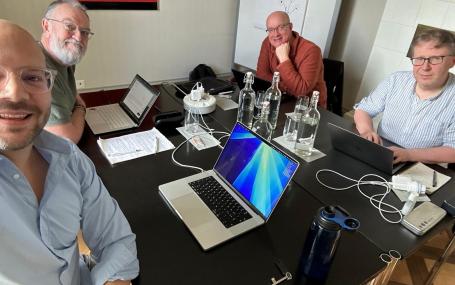Deborah Cameron played a foundational role in establishing the Faculty of Linguistics, Phonetics, and Philology. From the Faculty’s inception, she taught sociolinguistics with a particular focus on discourse analysis and language and gender.
Read all the latest news from the faculty, or visit our Events section to see what's on.
To receive our news as soon as it's published, subscribe to our RSS feed
We are looking forward to the inaugural lecture of Prof Devyani Sharma on Thursday February 12 (Week 4) at 5pm in the Schwarzman Centre theatre (basement level). Devyani’s lecture is co-hosted by English and LPP.
The Faculty of Linguistics, Philology and Phonetics welcomes Expressions of Interest in the British Academy International Fellowship Scheme. The deadline for expressions of interest is Wednesday 28 January.
Rasmus Puggaard-Rode has been awarded a small John Fell Fund grant to investigate the phonetics of an ongoing sound change in Danish, whereby the consonant /d/ is developing into a vowel.
The Faculty is offering one doctoral studentship and one postdoctoral research position to join the Oxford team of CURLEW (Census of Urban and Rural Language in England and Wales).
Building on a John Fell funded pilot, a Phonetics Laboratory research team (Jose Elias-Ulloa, Elinor Payne, Maida Percival and Ian Watson) have been awarded a large follow-up John Fell Fund grant to continue their research on the articulation and aerodyna
Applications for UNIQ 2026 are now open! Consider applying for the UNIQ Linguistics course.
Researchers from the University of Oxford and Ca’ Foscari University of Venice teamed up with students and staff at Cheney School, and with visual and performing artists, to create a festival of writing—with a special focus on elements of writing systems
Leverhulme Early Career Fellowships are designed to support scholars at a relatively early stage of their academic careers (defined as having submitted their thesis for viva voce examination no more than 4 years prior to the closing date), but with a prov
The Faculty of Linguistics, Philology and Phonetics will be holding an online Graduate Open Day via Microsoft Teams for all prospective graduate applicants on Thursday 20th November 2025 from 1-2pm (Greenwich Mean Time).
Frances Dowle’s Robins Prize winning article has been published in Transactions of the Philological Society.

David Willis is part of a team that has been awarded a grant of 2.5 million Swiss francs (£2.33m) for a new Census of Urban and Rural Language in England and Wales (CURLEW).
We are delighted that Dr Hilary Wynne has been awarded a British Academy/Leverhulme Small Research Grant for the following project: Eliciting language-specific signatures for expertise in the human brain: a neurolinguistic investigation of expectation dur
Dr Maria AloniILLC & Philosophy,University of Amsterdam FRIDAY 17th OCTOBER15.30-17.00SHIP STREET LECTURE THEATREJESUS COLLEGE OXFORD People often reason in ways that deviate from classical logic.
The Faculty of Linguistics, Philology, and Phonetics at the University of Oxford invites expressions of interest from postdoctoral and completing graduate scholars who wish to apply for the British Academy Postdoctoral Fellowship scheme for entry in 2026.
The Philological Society’s Robins Prize is once again an all-Oxford success story in 2025, with a current and a former LPP DPhil student sharing the award.

Oxford’s Faculty of Linguistics, Philology and Phonetics (LPP) is looking forward to an “extreme makeover” in its physical surroundings, as it prepares to move into the new Schwarzman Centre for the Humanities in September 2025.
In May 2025 the UK formally joined the CLARIN European Research Infrastructure Consortium as a full member.

Professor Devyani Sharma has been appointed to the Professorship of Language and Communication at the University of Oxford, a post endowed by News UK. She will take up this post on October 1st 2025.
The Faculty of Linguistics, Philology and Phonetics invites Expressions of Interest from researchers who wish to apply to the Marie Skłodowska-Curie European Postdoctoral Fellowship scheme.